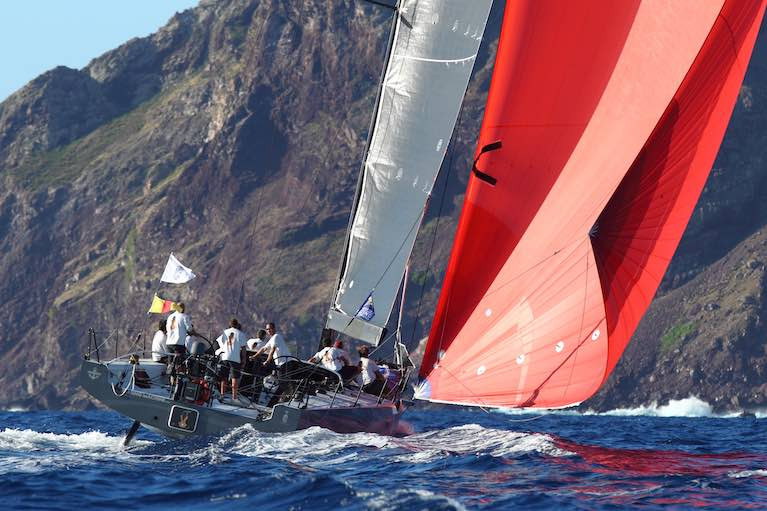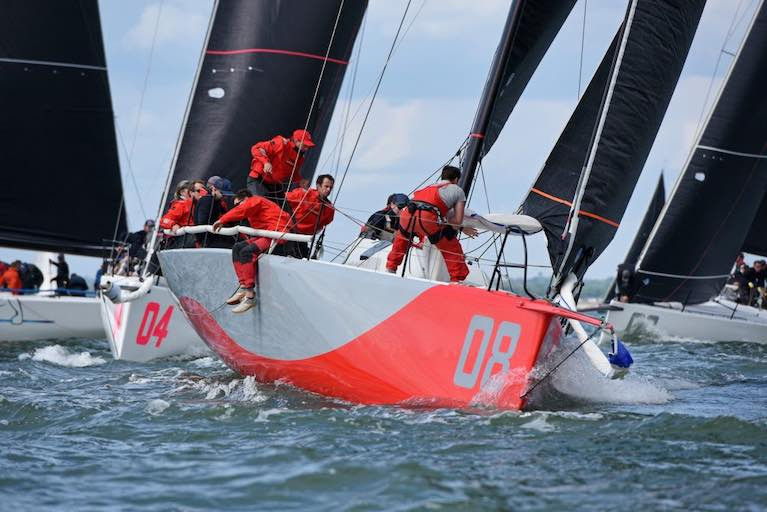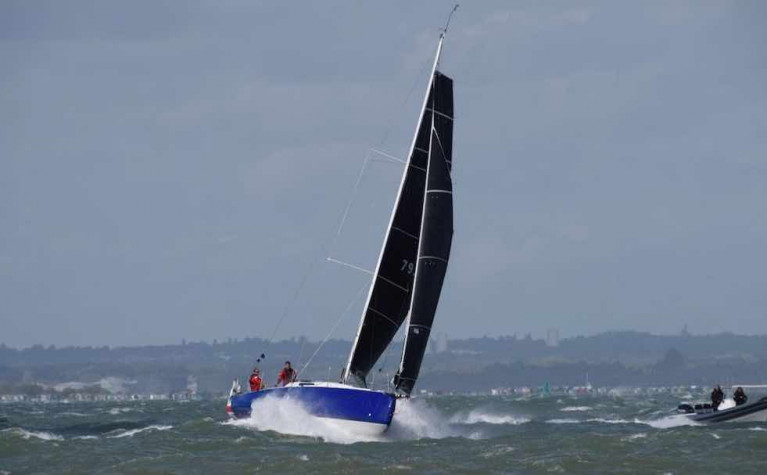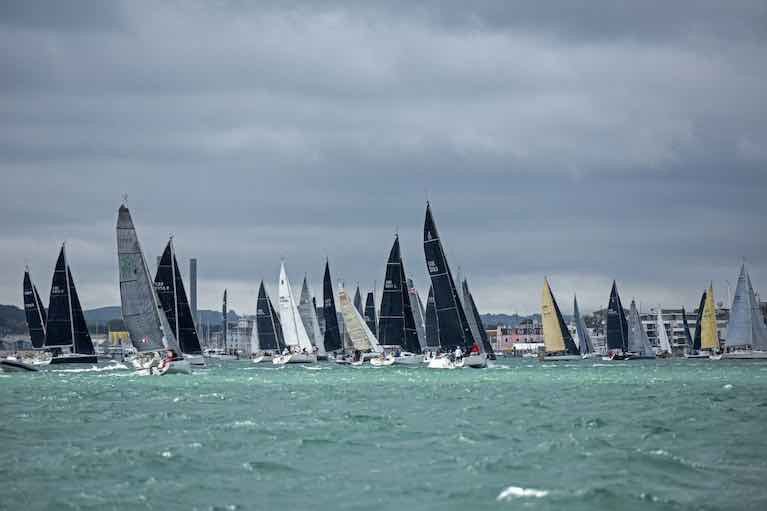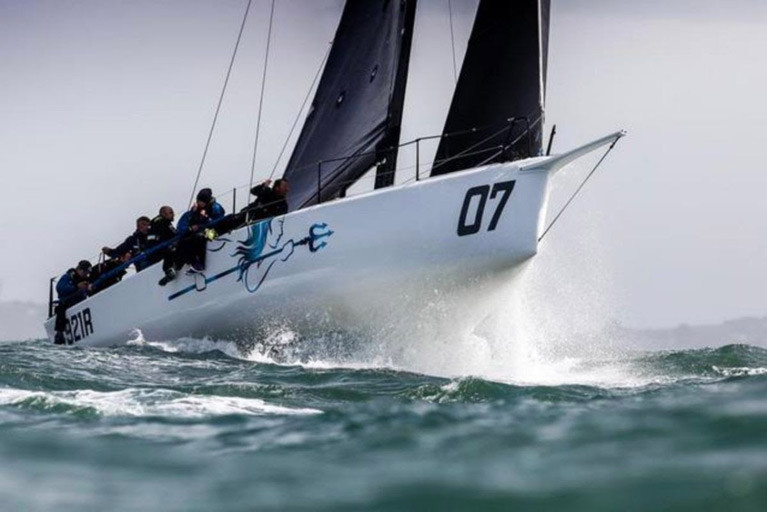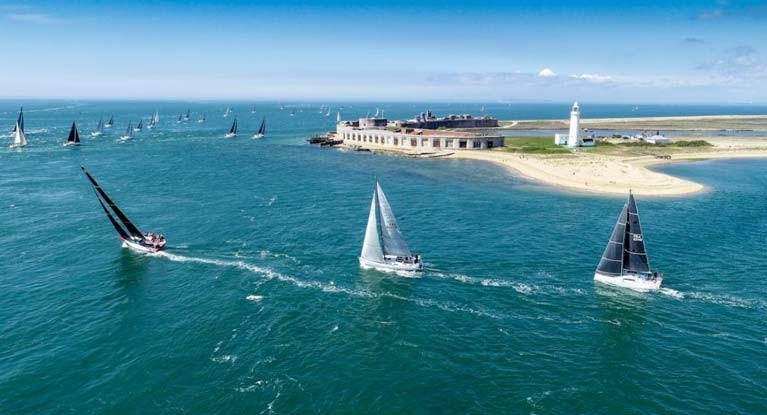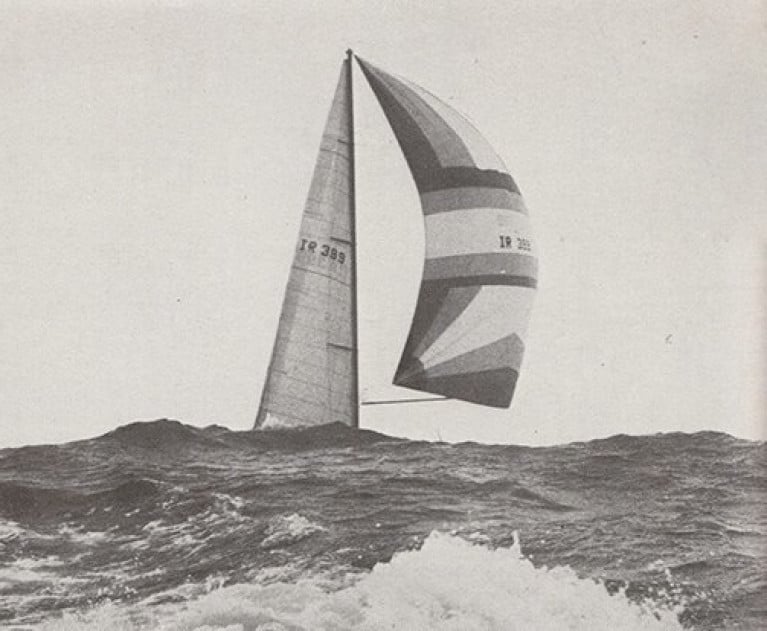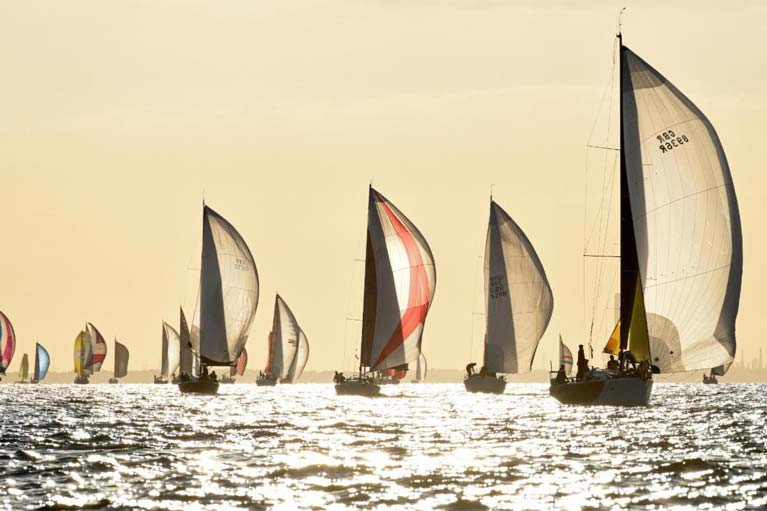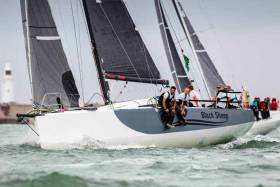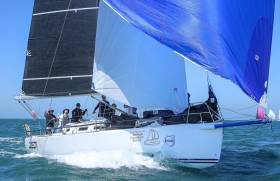Displaying items by tag: Royal Ocean Racing Club
Green Light for 2021 RORC Caribbean 600
The 13th edition of the RORC Caribbean 600 is scheduled to start off Fort Charlotte, Antigua on Monday 22nd February 2021.
“The RORC Flag Officers meet regularly and since July the overall commitment from the Club has been to provide safe racing when there is sufficient demand and when restrictions allow us to do so,” commented RORC Racing Manager, Chris Stone. “The early entries for the RORC Caribbean 600 and the enquiries we are receiving show that there is a real desire for the race to take place.”
The RORC Caribbean 600 course is unique; starting and finishing in Antigua, the competitors round 11 Caribbean islands. Warm trade winds and Caribbean swell provide superb sailing conditions and the local effects of the islands produce spectacular and strategic racing. For 600 miles the race is full of twists and turns with breath-taking scenery.
International travel is subject to change in the current climate. However, the Antigua & Barbuda Tourism Authority has published a useful page for entry protocols which is regularly updated: https://visitantiguabarbuda.com/travel-advisory/
Below is a summary of the latest advisory for travel to Antigua by air and sea.
To fly to Antigua, all passengers must have taken a negative PCR test prior to departure. Arriving by boat, all crew and passengers are to have a Negative PCR Covid-19 test result prior to travel. There is an established travel bubble comprising the six OECS countries, along with Montserrat and Barbados. Given the fluidity of the Covid-19 situation, countries may be removed from or added to the list. Travellers should keep up-to-date for any changes.
Statistically, Antigua is one of the safest places to travel and the Antigua & Barbuda Government have taken a serious approach to tackling the health crisis. The marinas in Antigua are all implementing protocols to control access to the docks. Wearing of face masks and sanitisation and social distancing is compulsory in public areas, except for beaches. The rules are very similar to those adopted throughout Europe. In addition, a curfew is in place from 11 p.m. until 5 a.m. each night.
Speaking with residents and business owners in English Harbour and Falmouth, the vast majority are very much open for visitors. The Antigua & Barbuda Marine Association (ABMA) reports that the docks are well-booked and marine service companies, restaurants, and stores are gearing up to receive an influx of boats for the Caribbean season.
The Antigua & Barbuda Ministry of Tourism and the Ministry of Health issue Covid-19 compliance training certificates to ensure yacht workers understand the necessary precautions needed to be taken to ensure the safety of all. Taxi drivers, yacht workers, restaurant, bar staff and vendors have all participated in health protocols workshops.
Entries for the 2021 RORC Caribbean 600 include a diverse fleet of boats including some of the world’s fastest monohull and multihull yachts. Entry list here.
The overall winner, decided on IRC rating will feature world-famous sailors competing with, and against, passionate Corinthian sailors. Early entries boast teams from over a dozen different nations from the Caribbean, Europe, North America and from Australia.
Franklyn Braithwaite, Commodore of the Antigua Yacht Club has been a part of the yachting community in Antigua for his whole life. “The Antigua Yacht Club looks forward to working with RORC for the 2021 edition of the RORC Caribbean 600. The Government and people of Antigua and Barbuda welcome the arrival of the boats and crew to enjoy our hospitality and sailing conditions while observing all necessary Covid-19 protocols. I wish everyone a safe and enjoyable regatta.”
Ino XXX & Redshift Celebrate RORC Series Success in Cowes
The Royal Ocean Racing Club's Summer Series came to a conclusion with the fourth and final race of the RORC Summer Series. A light airs 36-mile race was held in The Solent. Ed Fishwick’s GP42 Redshift took line honours and the overall race win after IRC correction. James Neville’s HH42 Ino XXX was second overall, and with the result, won the four-race series. Richard Palmer’s JPK 1010 Jangada, skippered by Jeremy Waitt, was third overall for the race and for the series. 136 boats entered the RORC Summer Series, which was designed to replace part of the 2020 RORC Season’s Points Championship.
Redshift’s Nick Cherry, a six-time figarista commented: “We really enjoyed this race and the series. Racing with six people, instead of ten, you really have to focus all the time and whilst we adapted our manoeuvres, we made no changes to the systems on board. When we get back to fully-crewed offshore racing, this has served as great practice, as you are in a watch system, often without the full complement of crew on deck.”
Congratulations to the class winners of RORC Summer Series Race 4 including Ed Bell’s JPK 1180 Dawn Treader and Sun Fast 3300 Fastrak XII, sailed two-handed by Henry Bomby & Shirley Robertson.
Full Results
IRC One
Overall series winner, RORC Vice Commodore James Neville’s Ino XXX scored a first and two second places in class to win IRC One. Michael O’Donnell’s J/121 Darkwood was second in class and Rob Bottomley’s MAT12 Sailplane 3 was third.
"Well done to the RORC Race Team for coming up with the idea and making it happen,” commented James Neville. “The day races have been quite special, as it’s a good day out for the crew and a real challenge, especially racing Ino XXX with a reduced number. The series has been held in an amazing range of conditions and has been a lot of fun.”
IRC Two
Ross Applebey’s Oyster 48 Scarlet Oyster was the run-away winner of IRC Two, scoring two bullets and a third. Gavin Howe’s Sun Fast 3600 Tigris was second in IRC Two and third in IRC two-handed. Ed Bell’s Dawn Treader was just two points behind in third.
IRC Three
Olympic two-handed hopefuls, Henry Bomby & Shirley Robertson, racing Nigel Colley’s Fastrak XII took the win in IRC Three and second in IRC two-handed. Richard Oswald’s Elan 450 Emily of Cowes was runner-up. Jim Driver’s Sun Fast 3300 Chilli Pepper was third.
After the second race, double Olympic Gold Medallist, Shirley Robertson commented: “Henry is an amazing young talent who has cut his teeth in the Figaro. Henry is a good teammate and a great teacher. It’s been good to hang out with Henry for the summer.”
IRC Four
Richard Palmer’s Jangada, skippered by Jeremy Waitt, was the clear winner of IRC Four and the winner of IRC two-handed. Chris Frost’s Swan 36 Finola was second in class in the last race to finish runner-up for the series. Tony White’s Sun Fast 3300 Mzungu was third.
MOCRA Class
Nine multihulls raced during the series and the smallest of the fleet came out on top for the series. Ross Hobson’s Seacart 30 Buzz was the victor. MOD 70 Powerplay, skippered by Ned Collier Wakefield, with Peter Cunningham on the helm, was second. James Holder’s Dazcat 1295 Slinky Malinki was third.
RORC 2H Autumn Series
Whilst the RORC Summer Series has come to an end, Friday 4th of September marked the start of the 2H Autumn Series. Race One was a race of approximately 100 miles, the first over-night race organised by the RORC since February. Jangada skippered by Jeremy Waitt, was the winner. Rob Craigie & Deb Fish racing Sun Fast 3600 Bellino were second. Sun Fast 3300 Wild Pilgrim, skippered by Daniel Jones, was third. The 2H Autumn Series, consisting of three races, continues on Saturday 26th September with another overnight race for two-handed teams.
The Royal Ocean Racing Club's Summer Series Race 3 was a full-on foam up in 25 knots of breeze gusting over 30. The long day race was a course of about 42 miles for the monohulls with a beat west from the Squadron Line to East Lepe, followed by a scorching downwind leg east through the Solent. After bisecting No Man’s Land and Horse Sand Forts, the downwind sleigh ride took the fleet to Pullar, northeast of the Nab Tower. The final leg was a beat to finish at the Squadron Line.
The stand-out performance in the race was Sun Fast 3300 Fastrak XII, raced Two-Handed by Henry Bomby & Shirley Robertson. Fastrak XII was the overall winner after IRC time correction and the victor in both IRC Three and IRC Two-Handed.
Bomby and Robertson have set their sights on representing Great Britain in the 2024 Olympics. Bomby is one of Britain's most promising young sailors having raced in four Solitaire du Figaro campaigns, the Volvo Ocean Race and two years with the MOD70 Phaedo3. Shirley Robertson has won two consecutive Olympic Gold medals, and whilst Robertson has offshore experience, the Two-Handed offshore discipline is a new experience.
“Henry is a legend!” commented Shirley Robertson. “We just felt really solid, never on the edge. We made decisions in anticipation and thought it through, making very few errors and sailed a really clean race. The rust is coming away gradually and although offshore racing is a bit unfamiliar for me, a small boat is my bread and butter. We are getting faster and faster, and I have got to say, Henry is an amazing young talent who has cut his teeth in the Figaro. Henry is a good teammate and a great teacher. It’s been good to hang out with Henry for the summer.”
Congratulations to all of the IRC Class Winners in the RORC Summer Series Race 3. Ross Applebey’s Oyster 48 Scarlet Oyster was the winner of IRC 2 and second overall, Scarlet Oyster scorched around the racetrack in an elapsed time just three seconds shy of Fastrak XII. Rob Bottomley’s MAT12 Sailplane 3, skippered by Nick Jones, took Line Honours for the race, was third overall, and winner of IRC One. Richard Palmer’s JPK 10.10 Jangada, sailed by Jeremy Waitt and Paul Wood, won IRC Four. Ross Hobson’s Seacart 30 Buzz won the Multihull Class.
During the race, Tom Kneen’s JPK 1180 Sunrise was dismasted. However, none of the crew were injured and all returned safely to shore. Tom Kneen expressed his gratitude to the assistance offered by fellow competitors; James Neville’s Ino XXX, Darkwood skippered by Steve Lawrence, and Rob Bottomley’s Sailplane 3.
Full details of the revised RORC racing programme can be found on the RORC website, but in summary: permitted crew offshore can be up to a maximum of six people from any household or two-thirds of a boat's IRC crew number whichever is the least. Competitors are also reminded of the government guidance on social distancing and other Covid-19 measures.
The Royal Ocean Racing Club's Summer Series comes to a conclusion with the fourth and final race scheduled for Sunday 6th September. Further racing with the club is set to continue in September with a new Two-Handed Autumn Series (4th, 26th Sept. & 10th Oct.) as well as the IRC National Championship (11/13 Sept.) and the IRC Two-Handed National Championship (12/13 Sept.)
RORC Cancels Season’s Points Championship
For the first time in the history of the London club, the RORC Season’s Points Championship has had to be cancelled. Current restrictions continue to make it impossible to run overnight races for all IRC classes with the result that the last offshore race of the season, the Cherbourg Race has had to be cancelled. With only two races, the RORC Transatlantic Race and the RORC Caribbean 600 having been completed, and three required to constitute a series, the club has had no option but to cancel the 2020 Season’s Points Championship.
“This has been a difficult and unprecedented decision for the club,” said RORC Commodore Steven Anderson. “We were very keen to have one proper offshore race for all classes to allow us to complete the series. We all hoped that by September the restrictions to control the spread of the virus would have been eased sufficiently to allow a sprint to Cherbourg and a good way to end a very frustrating season for all.”
RORC Two-Handed Race to Cherbourg
Instead of the usual season ending Cherbourg Race, the RORC has confirmed the intention to run a two-handed race to Cherbourg. This race which will start on Friday 4th September is in line with current government regulation and has added significance in that the City of Cherbourg will host the finish of the Rolex Fastnet Race for the 2021 and 2023 editions.
RORC Racing Manager Chris Stone has been delighted with the number of teams who are participating in the summer series.
“We were pleased to have 133 boats in ‘Race the Wight’, the first race of our Summer Series and interest in the rest of the series is very strong. We decided to start the two-handed race to Cherbourg on the Friday to give the opportunity for those two-handed teams who are involved in the summer series to participate in the last race of the series which is scheduled for Sunday 6th September.”
The RORC Summer Series consists of three additional races on Saturday 15th August, Saturday 22nd August and Sunday 6th September.
85 Entries for RORC Race the Wight
The Royal Ocean Racing Club is expecting in excess of 100 entries for Race the Wight, scheduled to start on Saturday 1st August. All entry fees will be donated to the NHS Trust and the Scaramouche Sailing Trust. Race the Wight will be the first of a four-race RORC mini-series during August and September.
“As a charity, we rely on donations and grants. Every pound we receive goes towards getting more students from different backgrounds sailing,” commented Jon Holt, Scaramouche Sailing Trust. “Our next big goal is to be on the start line of the Rolex Fastnet Race 2021. We are grateful for the ongoing support from RORC and proud to be named as one of the charities for the race.” The Greig City Academy will have upwards of a dozen students on different boats for the race.
IRC Classes for the 50nm race around the Isle of Wight are still to be confirmed. However, early entries indicate a fleet full of champions with any number of potential victors.
RORC Vice Commodore James Neville racing his HH42 Ino XXX and Ian Atkins’ Melges IC37 Icy are favourites for monohull line honours. The overall winner of the Race the Wight will be decided by time correction using the IRC Rating System. In big upwind conditions Sir Geoffrey Mulcahy’s Swan 56 Noonmark IV, skippered by Mike Gilburt, will be a force to be reckoned with. Given the crew limitations and favoured wind conditions, Greg Leonard‘s Class40 Kite (Prev. Maxime Sorel’s V and B, winner 2017 Rolex Fastnet Race) should blast round the island.
 Ian Atkins’ Melges IC37 Icy
Ian Atkins’ Melges IC37 Icy
 Greg Leonard's Class40 Kite Photo: John Green Cowes
Greg Leonard's Class40 Kite Photo: John Green Cowes
“We are looking forward to it,” commented James Neville. “It’s been completely frustrating to have missed racing. We have been modifying the boat over the winter and part of this race will be to test and learn what can be done. The race will give us the experience to move on to the next steps in terms of how we can race the boat given the current restrictions. We have had one training session and it is certainly all on when we gybe. However personally, I wouldn’t go out if we were unable to use spinnakers because it is important to get the boat lit up. We will be racing with six and be taking all the necessary precautions.”
“I am beyond excited!” Exclaimed Ian Atkins. “The challenge now is whittling a crew of nine down to six, but we will probably rotate the crew during the mini-series. Everybody on board is very capable, so they should all get a chance to race during the series. You need all nine crew in a blow on a short windward leeward race, but round the Wight is perfect to stretch our legs without too many corners to negotiate.”
 Tom Hayhoe and Natalie Jobling will be racing J/105 Mostly Harmless Two-Handed and both work for the NHS Trust. Photo: Rick Tomlinson
Tom Hayhoe and Natalie Jobling will be racing J/105 Mostly Harmless Two-Handed and both work for the NHS Trust. Photo: Rick Tomlinson
18 J/Boats have already entered the race, Tom Hayhoe and Natalie Jobling will be racing J/105 Mostly Harmless Two-Handed and both work for the NHS Trust. Michael O’Donnell’s J/121 Darkwood won last year’s RORC Channel Race and will be competing with a crew of five.
“With water ballast and a sail configuration designed for short-handed sailing, we are actually sailing with our optimum crew, even with the restrictions,” commented Michael O’Donnell. “The race around the Isle of Wight, starting at the Royal Yacht Squadron, is possibly the most iconic in the world - we just can’t wait to get out there.”
"The permitted crew can be up to a maximum of 6 people from any household or two-thirds of a boat’s IRC crew number whichever is the least"
Eight examples of Beneteau’s Sun Fast yachts have entered including the overall winner of the 2019 RORC Season’s Points Championship, Trevor Middleton’s Black Sheep and last year’s season runner up Bellino, raced two-handed by Rob Craigie and Deb Fish. Two Sun Fast 3300 will be racing, Peter Bacon’s Sea Bear and Jim Driver’s Chilli Pepper.
Five JPKs have already entered, including Richard Palmer’s JPK 10.10 Jangada, overall winner of the 2019 RORC Transatlantic Race. Jangada will be facing new teams in similar designs. Peter Butters JPK 10.10 Joy, and JPK 11.80s; Ed Bell’s Dawn Treader and Astrid de Vin’s Il Corvo.
 1939 Giles one-off design Whooper Photo: Paul Wyeth
1939 Giles one-off design Whooper Photo: Paul Wyeth
 2019 Quarter Ton Cup Champion Protis. Photo: Rick Tomlinson
2019 Quarter Ton Cup Champion Protis. Photo: Rick Tomlinson
Vintage yachts abound through the fleet including some of the smallest entries, 2019 Quarter Ton Cup Champion Protis, with Ian Southworth on the tiler, will be able to gauge their performance against Tony Hayward’s Blackfun. Past RORC Commodore Peter Rutter will be racing his restored Half Tonner Quokka 9. Giovanni Belgrano is part of the structural design team for INEOS Team UK for the America’s Cup and his 1939 Giles one-off design Whooper has solid form for the race. Whooper is a past winner of the Gold Roman Bowl in the ISC Round the Island Race, beating over a thousand competitors. Ross Applebey’s Oyster 48 Scarlet Oyster will also be in action and was in fine form recently winning class once again in the RORC Caribbean 600 and overall winner of 2019 RORC Cowes St Malo.
 Simon Baker’s Dazcat 1495 Hissy Fit. Photo: James Tomlinson
Simon Baker’s Dazcat 1495 Hissy Fit. Photo: James Tomlinson
In the MOCRA Class, last year’s ISC race winner will also be competing, Simon Baker’s Dazcat 1495 Hissy Fit. Strong challengers in the multihull class include 2019 RORC Season winner, Ross Hobson’s Sea Cart 30 Buzz, and third in the 2019 RORC Season’s Points Championship, James Holder’s Dazcat 1295 Slinky Malinki.
Full details in the Notice of Race can be found in the Notice of Race but in summary: permitted crew can be up to a maximum of 6 people from any household or two-thirds of a boat’s IRC crew number whichever is the least.
Competitors are also reminded of the government guidance on social distancing and other Covid19 measures.
RORC Announce Further Cancellations to the 2020 Sailing Season
The Royal Ocean Racing Club announces further cancellations and changes to some of its key events as the season progresses and the COVID-19 pandemic continues throughout April.
The decision comes after continued close monitoring of Government and medical advice, and in line with guidance from World Sailing and the RYA. The RORC's intention is to adapt its race programme and courses as necessary in order to get members and competitors on the water as soon as it is possible and appropriate.
Myth of Malham - Cancelled
One of the most popular and tactically challenging races, the 230nm Myth of Malham race, scheduled to start on Saturday 23rd May (Bank Holiday), has regretfully been cancelled. The course from Cowes, around Eddystone Lighthouse and back to a finish in the western Solent, mirrors the first 130nm of the Rolex Fastnet Race and takes in some of the most complex tidal gates around notable headlands that include Portland Bill and Start Point.
De Guingand Bowl - Cancelled
The next cancellation in the 2020 RORC Season's Points Championship is the De Guingand Bowl on Saturday 6th June. The race traditionally sails a course relatively close to the Isle of Wight with a Club finish back in the Solent.
RORC Racing Manager Chris Stone comments: "In previous editions, it has provided a great opportunity for the Race Committee to try different aspects of course setting to challenge the fleet and its navigators. Last year we tried out some really exciting and new ideas around the course and the weather, and we were extremely keen to keep that going again. Sadly it's not to be this year, but we will continue to explore these ideas in 2021!"
East Coast Race - Under review
The Club is also working closely with EAORA (East Anglian Offshore Racing Association) and the East Coast Race which is still currently scheduled for the 19th June. The Associations' PRO, Paul Jackson said: "The East Coast Race is still under review. There have been some positive comments from the Netherlands, but it is still early days at the moment and we will wait until we are a little closer to the event to make a final decision."
IRC National Championship - Potential Date Change
The RORC is also considering moving the IRC National Championships from its scheduled June timeslot to Friday 11th, Saturday 12th and Sunday 13th September. The potential move would see the IRC Nationals being run together with the IRC Double-Handed National Championship scheduled for the same weekend.
This is the same weekend as the Irish IRC Nationals that will be raced as part of WAVE Regatta in Howth, County Dublin.
IRC Rating Director Dr Jason Smithwick commented: "This later schedule for the IRC Nationals could be a good result for the IRC fleet. A later schedule in September should allow the best chance of giving the national IRC fleet a top-level event with sailing in good conditions."
RORC Commodore Steven Anderson commented: "Today's announcement cancelling our next two offshore races were inevitable, however, we are keeping all our options open to get the fleet back on the water as soon as it is appropriate. We may have to shift our focus to more Solvent-based racing, or at least racing a little closer to home, but it's our intention to get as much racing into our programme as we can and adapt events and the programme as necessary."
If we needed a reminder of the central role which the biennial Round Ireland Yacht Race from Wicklow has grown into within Irish sailing and in the global offshore racing context during its 40 years and 20 editions, then the ramifications of its postponement from the 20th June 2020 to the 22nd August is really all that is required to signal the importance of this 704-mile challenge.
In the very complete Coronavirus COVID-19 meltdown of normal life, the numbers of sailors and others advocating such a move – or something similar - had been steadily increasing, as it became increasingly evident that the date was still available and possible, yet needed to be booked well in advance. As the time needed for the countrywide eradication of the disease is still very much an unknown - despite increasingly sophisticated analyses of its progress – the latest possible date for the race while still placing it within the summer season was the one which had to be chosen.
The sympathies of any reasonable person and all experienced sailors – particularly the large numbers who have raced in this very special event – will have been very much with Wicklow SC Commodore Kyran O’Grady and his organising team, together with their new, supportive and understanding sponsors in SSE Renewables, as they grappled with a challenging decision.
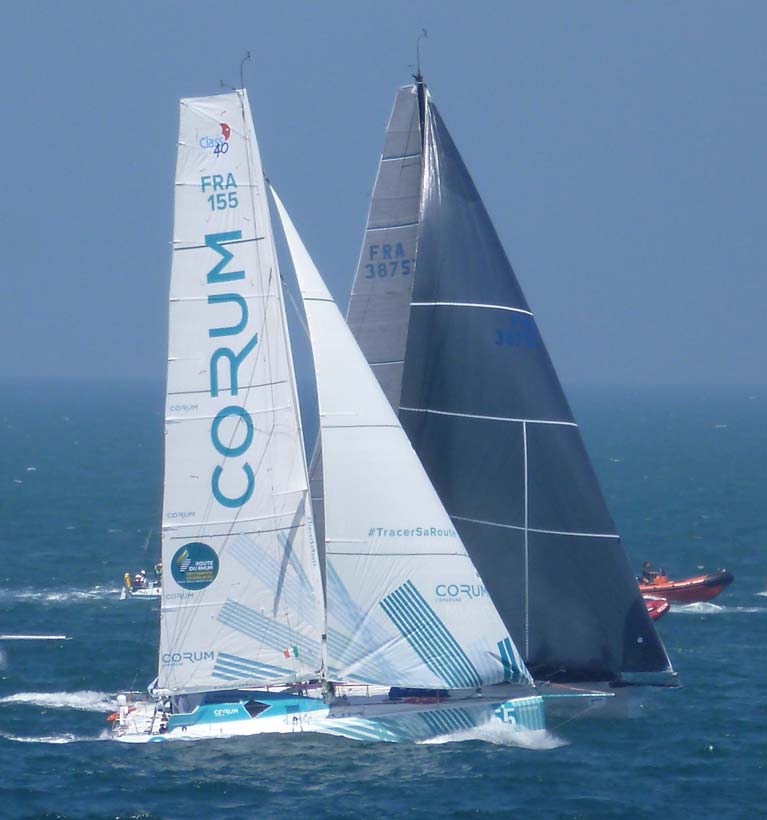 The modern Round Ireland Race has international credentials – France’s Corum and Teasing Machine battle it out at 2018’s start. Photo: W M Nixon
The modern Round Ireland Race has international credentials – France’s Corum and Teasing Machine battle it out at 2018’s start. Photo: W M Nixon
An event of this stature has a dominant position in the entire complex season-long structure of the Irish sailing programme. Thus, even when it had to be postponed by only one week to June 30th in 2018, the rest of the national cruiser-racer schedule in that period of the summer adjusted itself accordingly.
But that was a minor change by comparison with this new two months hiatus during which – if the lock-down is so successful that it can start to be significantly eased – we can expect pop-up regattas and immediate sailing events to be rapidly organised in the best flash mob-style the instant sailing becomes possible again.
In the crazy times we live in, and with everyone probably slightly off their rockers by the time we do get sailing again, it’s perfectly possible that folk will get a taste for this sort of ad hoc arrangement, and a long countdown event like the Round Ireland will seem almost quaint.
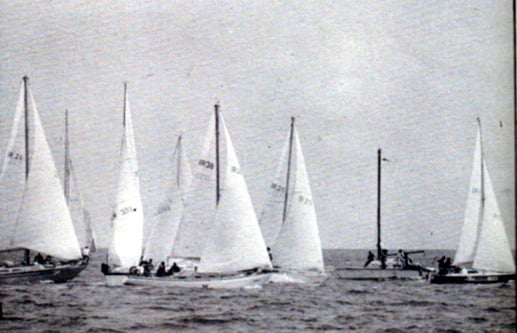 Small beginnings – the start of the first Round Ireland Race off Wicklow in 1980. The winner was Brian Coad’s Rival 34 Raasay of Melfort (centre) from Dunmore East. Photo: W M Nixon
Small beginnings – the start of the first Round Ireland Race off Wicklow in 1980. The winner was Brian Coad’s Rival 34 Raasay of Melfort (centre) from Dunmore East. Photo: W M Nixon
But by its very nature, the Round Ireland has to be a long countdown event, for it requires participating crews to have logged a certain amount of minimal experience in serious offshore competition, such that one of the strongest pressure groups in urging a specific postponement was the sailing schools, who reckoned they’d find it very difficult to fulfil their quota of qualifiers in such a truncated early season.
Yet with other potential events starting to wave flags about easily re-shaped happenings which can be put together almost overnight, serious Round Ireland owner-skippers are going to find themselves in a quandary, for although a successful offshore racing crew is not a democracy, nor is it an autocracy. Decisions are reached through a sort of osmosis.
Denis Doyle & Moonduster
In these circumstances, the best approach is to ask: “What would The Doyler have done?” Or rather, “What would The Doyler do?” For although the great Denis Doyle of Cork has been gone from among us now for 19 years - having sailed his last Fastnet Race on the Crosshaven-built Frers 51 Moonduster at the age of 81 in 2001 - his sailing inspiration and moral example is so strong that, for an entire generation of Irish offshore campaigners, it’s The Doyler who continues to be our reference point, our ever-present guide, our moral compass.
 Denis Doyle – he was racing offshore for sixty years
Denis Doyle – he was racing offshore for sixty years
Yet by seeing him as such, we aren’t contravening the great Dwight D Eisenhower’s hallmark of a successful commander, which was revealed here in a fascinating piece about strategy and tactics by that renowned soldier-sailor Commandant Barry Byrne, originally of Wicklow, and no stranger to success in the Round Ireland Race himself.
The word from Commandant Byrne was that Eisenhower was totally supportive of high-level commanders and staff officers who were always planning, but didn’t have some sacred fixed Plan, other than an ultimate objective.
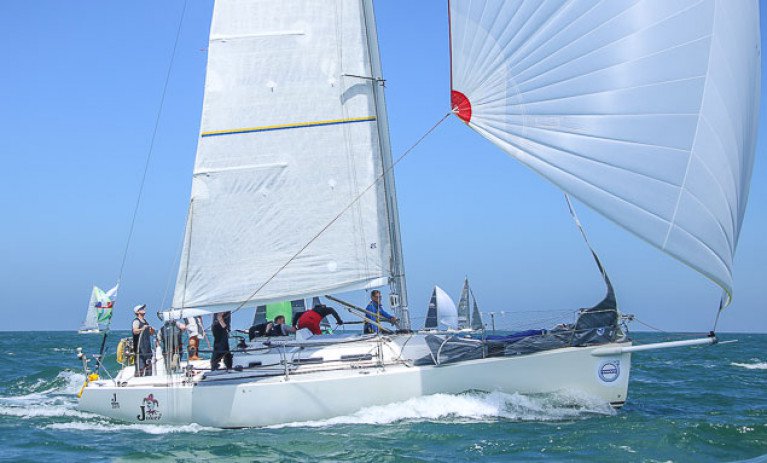 The J/109 Joker II (John Maybury, skippered by Barry Byrne) at the start of the 2018 race, in which she finished second overall. Photo: Afloat.ie/David O’Brien
The J/109 Joker II (John Maybury, skippered by Barry Byrne) at the start of the 2018 race, in which she finished second overall. Photo: Afloat.ie/David O’Brien
Thus Denis Doyle, who was racing offshore from the late 1930s until just after the turn of the century, was keen to go offshore racing, and even keener if he felt it was good for Cork, good for Ireland, and good for life generally – his ultimate objective was broad in scope.
So although the first Round Ireland Race of 1980 from Wicklow (see the first set of sailing instructions here) was seen by many in the Irish sailing community as a rather cheeky shot in the dark from a small club, Denis Doyle in Cork saw that it was good, and with his new Moonduster built in 1981, he arrived into Wicklow with this marvellous boat for the next race in 1982, and his commitment to the Round Ireland Races thereafter was complete, contributing enormously to its long-standing success.
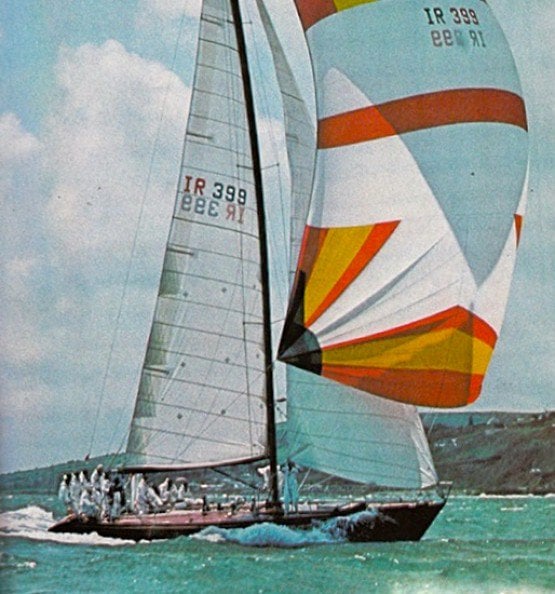 “This marvellous boat” – the new Crosshaven-built Frers 51 Moonduster in 1981. Photo: W M Nixon
“This marvellous boat” – the new Crosshaven-built Frers 51 Moonduster in 1981. Photo: W M Nixon
Now admittedly all the Round Ireland Races in which he competed – winning two of them and establishing course records in both 1982 and 1984 – were placed firmly in the final week of June, which thus left the later part of the season clear for other events for Moonduster, events which could be very distant.
For instance, one year he and three others including his ever-supportive wife Mary set out to sail Moonduster post-haste to Sardinia in order to race in the Sardinia Cup. And as well, the elegant varnished sloop was no stranger to the regattas in Galicia in northwest Spain, so much so that when I first ambled into the Monte Real Yacht Club in Bayona after an unusually agreeable Biscay crossing back in 1995, it was to note with interest that the newly-installed board listing Honorary Members was so new it had just two names on it – Denis Doyle and some guy called Juan Carlos.
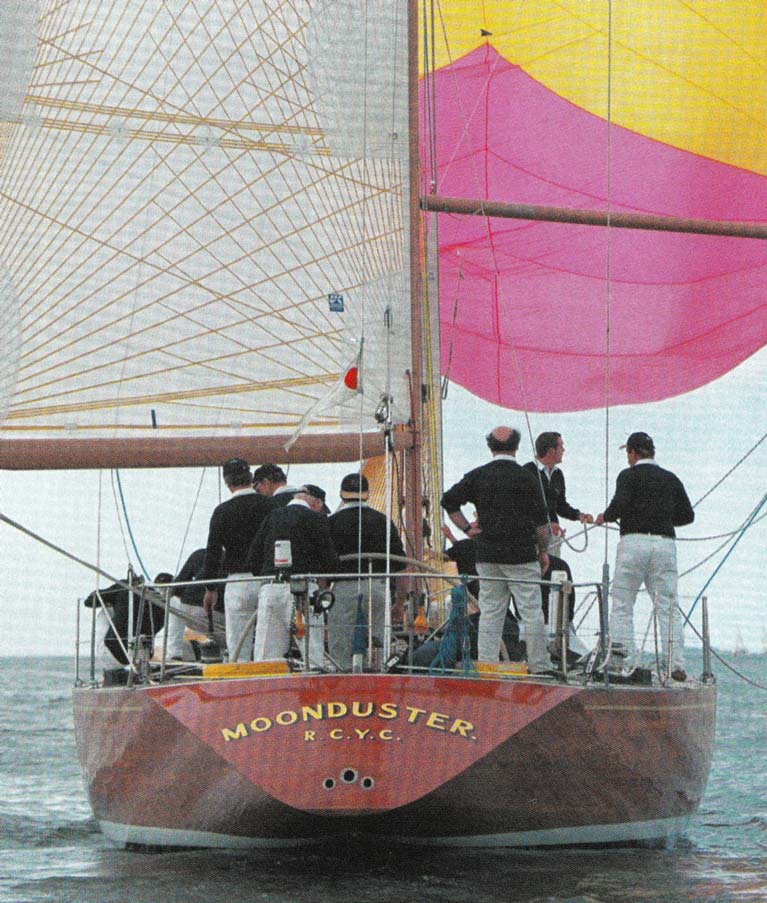 Throughout his 20 years with the Frers-designed Moonduster, Denis Doyle kept her topsides varnished. This is how she looked in 1995, at the start of the Dun Laoghaire-Dingle Race. Photo: David O’Brien/Afloat.ie
Throughout his 20 years with the Frers-designed Moonduster, Denis Doyle kept her topsides varnished. This is how she looked in 1995, at the start of the Dun Laoghaire-Dingle Race. Photo: David O’Brien/Afloat.ie
So his reach in sailing was truly pan-European, yet once he’d given his commitment to some event and its locality, his commitment was maintained through thick and thin, a commitment which remained through major changes when those changes were caused by circumstances beyond the control of the event organisers. So although the Round Ireland Race is now going to be two months late, I think we know what The Doyler would do.
For sure, the nights will be significantly longer and the weather of late August can be verging into the Autumnal. But those longer nights don’t seem quite so brutal as some of the short nights of June, for the sea has become significantly warmer and if the weather is benign, there’s a velvet quality to those longer nights which can make them a pleasantly memorable experience.
But either way – good weather or mixed – we can be sure that if Denis Doyle were still around, any ideas he might have had about other sailing plans for late August would have been scrapped in the exceptional circumstances caused by the COVID-19 outbreak, and first priority would be given to the original commitment of being on the starting line for the Round Ireland Race, even if Force Majeure has caused it to be held two months late.
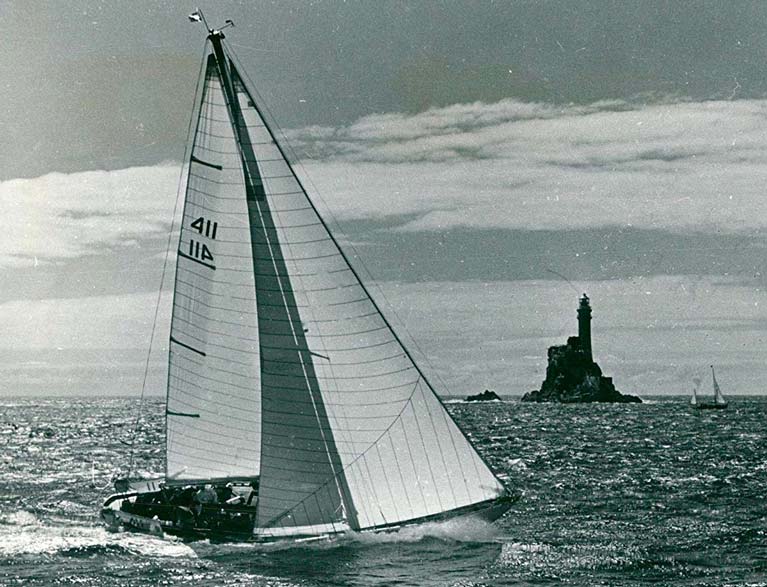 The original “white Moonduster”, a 47ft Robert Clark design built in Crosshaven in 1965, making to windward towards the Rock in the Fastnet Race of 1969
The original “white Moonduster”, a 47ft Robert Clark design built in Crosshaven in 1965, making to windward towards the Rock in the Fastnet Race of 1969
He would be there because it’s the right thing to do. This attitude was clearly revealed back in 1972, when Denis Doyle was a flag officer both of the Royal Cork YC and the Royal Ocean Racing Club, and still racing the handsome Robert Clark-designed Crosshaven-built 47ft white Moonduster of 1965 vintage. The core event of the season was one with which he was particularly involved, an RORC Cowes to Cork Race after Cowes Week, something which promised great sport for a large entry.
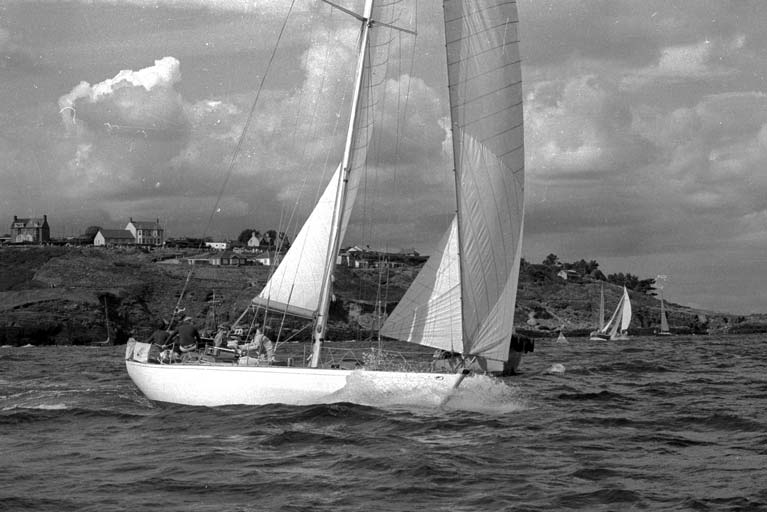 The original Moonduster manoeuvring before the start of the 1970 RORC Cork-Brest Race, after the RORC fleet had raced Cowes-Cork as part of the Royal Cork YC Quarter Millennial celebrations. Photo: W M Nixon
The original Moonduster manoeuvring before the start of the 1970 RORC Cork-Brest Race, after the RORC fleet had raced Cowes-Cork as part of the Royal Cork YC Quarter Millennial celebrations. Photo: W M Nixon
But as 1972 progressed, the Troubles in Northern Ireland deepened rapidly with much bloodshed, and the top management in the RORC became jittery about their fleet racing to “war-torn Ireland”. Denis assured them that nowhere was further and safer from the northern troubles than the race’s destination at the Royal Cork YC in Crosshaven, but he was over-ruled, and the decision was made to race instead from Cowes to Santander in Spain.
Denis took this rebuff in his usual calm way, and entered Moonduster for the 1972 RORC Cowes-Santander Race. As was her wont, Mary Doyle went out to Spain to be ready to welcome her husband and his crew at the finish. And as Moonduster glided up the river, there indeed was Mary, coolly stylish as ever, elegantly waiting beside the smoking ruins of the Real Club Maritimo de Santander. It had been blown up by Basque Separatists the night before.
RORC 'Sympathetic' to Royal Cork Yacht Club Following Cork Week Tricentenary Cancellation
The Royal Ocean Racing Club (RORC) in London says it is 'especially sympathetic' to the Royal Cork Yacht Club concerning their Tricentenary Celebration cancellations in July.
As Afloat reported earlier, the Cork Week Regatta, the IRC European Championships, and many other activities have all been cancelled.
The oldest yacht club in the world announced today that they took this difficult decision in conjunction with their partners to safeguard the health of sailors, visitors, volunteers and the community at large, and to give certainty to those participants and visitors who had scheduled to come to Cork in July.
RORC's Morgan Cup race, scheduled for 8th July was to act as a feeder race for the Cork Tricentenary Celebrations, however, due to the cancellation, the course will no longer head to Ireland. At this stage, there is no planned replacement course, but it likely to finish in the vicinity of the Solent.
RORC Racing Manager Chris Stone commented: "We are in extraordinary times and making these decisions, whilst unavoidable due to the Coronavirus pandemic, has still been very hard at the beginning of an exciting season of races. There is a huge amount of planning that goes into every race we run, so we can sympathise with the Royal Cork Yacht Club who have been in the planning process for many years. We will continue to monitor the pandemic and keep those who race with us fully informed in good time about the next races in the RORC Season's Point Championship."
In line with the continued COVID-19 Government guidance, as well as advice from many of the host finishing clubs in Europe, the RORC has, with regret, had to cancel or change a number of its key events.
The Cervantes Trophy race from Cowes, Isle of Wight to Le Havre, France scheduled for the 8th May has been cancelled. Le Havre port remains closed and is unlikely to re-open until later in May or early June. Members of the SRH (Société des Régates du Havre) and volunteers for this race have turned their attention to weekly Virtual Regatta inshore racing and drinks over their racing WhatsApp group - (Thursday nights for anyone interested).
RORC's North Sea Race which starts from Royal Harwich Yacht Club and sails to the Dutch port of Scheveningen has also been cancelled. The race - which was due to start on 22nd May - has traditionally joined forces with Scheveningen Yacht Club's North Sea Regatta (the Vuurschepen Offshore Race) which was to celebrate its 75th regatta anniversary. Dutch authorities have currently closed the port, the Club, and limited recreation activities until 1st June.
RORC has also elected to cancel the Vice Admiral's Cup Regatta, scheduled for 15th-17th May. In recent years, this inshore regatta has enjoyed considerable growth and has become a 'must-do' event for one-design and specialist classes. With competitors needing to confirm details for the regatta, and with the RORC Cowes Club House being closed in line with Government guidelines, it was felt prudent and in the interest of all parties to cancel the event early.
More than 5,000 sailors from around the world, racing in a dazzling variety of 570 yachts, took part in the 2019 RORC Season's Points Championship. The world's largest offshore racing series comprised 14 testing races and every race had its own coveted prize for the overall winner and for IRC class honours. The 2019 RORC Season's Points Championship destinations included the Caribbean islands of Antigua and Grenada, and the Spanish island of Lanzarote. There were six European destinations: France, Great Britain, Belgium, Ireland, Malta, and the Netherlands.
The 2019 Royal Ocean Racing Club Annual Dinner and Prize Giving was held in the Grand Connaught Rooms with 250 guests attending the spectacular black tie event. Prize winners, competitors, crews, RORC members and guests celebrated the year's achievements with the Royal Ocean Racing Club.
A champagne reception was followed by dinner and the prize giving in the Grand Connaught Rooms. Dating back to 1775, with its grand Georgian architecture and art-deco interiors, the historic building has hosted some of the world's leading politicians, royalty and celebrities. There was a huge ovation for the overall winner of the 2019 RORC Season's Points Championship, Black Sheep, and for the RORC Yacht of the Year, Wizard.
Winning the Jazz Trophy for first overall in IRC was Trevor Middleton's Sun Fast 3600 Black Sheep. Skippered by Jake Carter, the team collected five more awards: Jacob Carter was awarded the Keith Ludlow Trophy for the Navigator on the yacht that is First in IRC Overall, and the Duncan Munro Kerr Youth Challenge Trophy. Black Sheep also won the Grenade Goblet for first in IRC Three, the Serendip Trophy for Best Series Produced Yacht, and the Alan Paul Trophy for Consistent High Performance.
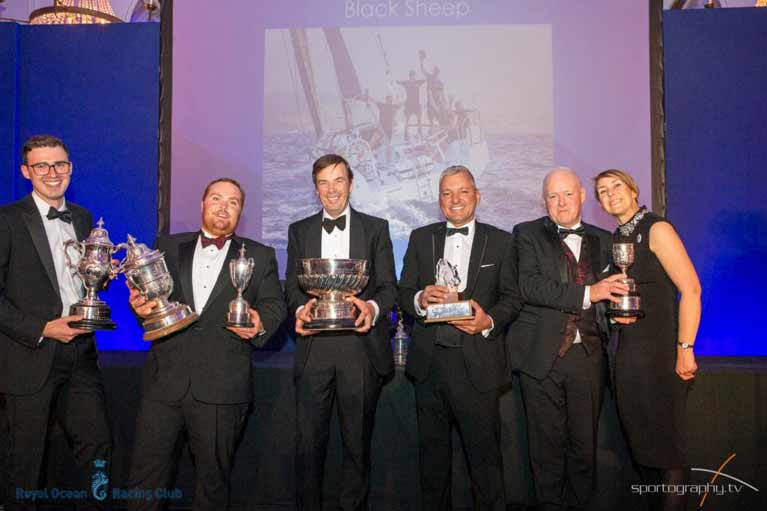 Trevor Middleton and team on Sun Fast 3600 Black Sheep collect the overall winners trophy, along with a hoard of silverware at the RORC Season's Points Championship © Sportography.tv
Trevor Middleton and team on Sun Fast 3600 Black Sheep collect the overall winners trophy, along with a hoard of silverware at the RORC Season's Points Championship © Sportography.tv
Black Sheep was crewed by friends who met during the Clipper Round the World Race and their debut race for the RORC season was the RORC Transatlantic Race. Black Sheep was the smallest yacht in the race, taking just under 17 days, and after IRC time correction, was second overall. During the season, Black Sheep's main rival for IRC Three, and for the overall season win, was another British Sun Fast 3600, Bellino. Bellino was raced Two-Handed by Rob Craigie and Deb Fish. Bellino beat Black Sheep by one place in the Rolex Fastnet Race, to set up a winner take-all final encounter in the Rolex Middle Sea Race. Black Sheep won the duel, winning the 2019 RORC Season's Points Championship overall and IRC Three by a small margin; just 2.2 points.
"We set out to win the Championship, but it was not until halfway through the season that you realise how big a commitment it is," commented Trevor Middleton. "Black Sheep has done close to 10,000 miles of racing and deliveries. The team come from the Clipper Race and this has been a fantastic, yet different experience. Whilst the RORC races are shorter, the Clipper experience made us stronger for the longer races. A big thank you to the RORC, their organisation is excellent, their entry system and race procedures are second to none. Also, when you get to places like Lanzarote, Grenada and Antigua, the shoreside logistics and parties are so very well done."
The 2019 RORC Yacht of the Year, winning the Somerset Memorial Trophy was Peter and David Askew's Volvo Open 70 Wizard, which is the first American yacht to win the accolade for over 20 years. Wizard's overall win in the RORC Caribbean 600 and the Rolex Fastnet Race in the same season is unprecedented. This double victory has never been achieved before by any other yacht.
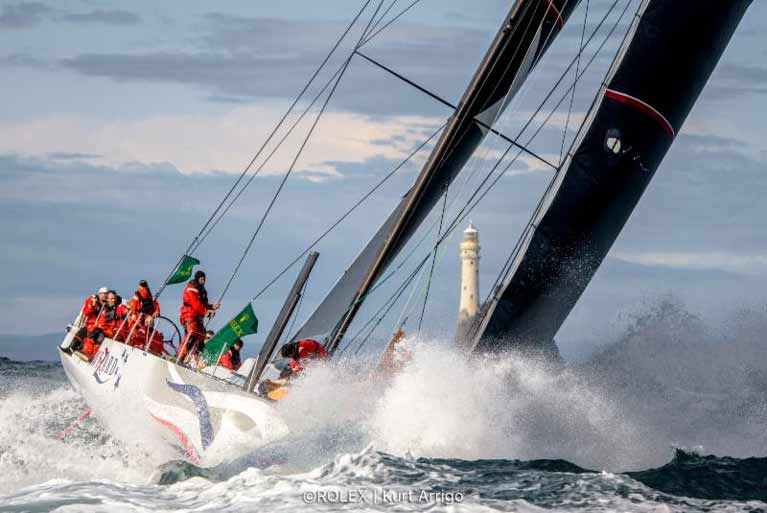 Wizard, Peter & David Askew's Volvo Open 70 - RORC Yacht of the Year Photo: Rolex/Kurt Arrigo
Wizard, Peter & David Askew's Volvo Open 70 - RORC Yacht of the Year Photo: Rolex/Kurt Arrigo
"The Fastnet Challenge Cup is now at the New York Yacht Club - being able to display the Cup at the NYYC is really special. At the NYYC annual awards last weekend we got a chance to study the inscribed names of the previous winners. It was an "oh my" moment to see the name Wizard in close proximity to names like "Imp" and "Tenacious", boats of immense historical importance," commented David and Peter Askew. "When Peter and I were young boys we idolized these boats and the sailors that crewed them and dreamed of having our own success someday. We think a real measure of success is to earn the recognition of your peers. To be recognized by a group of peers on the other side of the Atlantic Ocean is a true honour! To be awarded the Somerset Memorial Trophy is something we will always be very proud of.
"Peter and I have always operated on the principle to have the best tool possible for the job. That being said, everything else counts too, plus a little luck. We had the perfect storm of all of the above. We set out to win the Atlantic Ocean Racing Series and we felt the VO 70 would be the best platform. Charlie Enright, Mark Towill, Will Oxley and the rest of the guys did the real work. All said and done, we think our success is proof that our process works.
"We are disappointed to not be able to personally accept the Somerset Memorial Trophy. Peter has foot surgery some days prior and I must remain in the States to receive an award from my local Yacht Club (Annapolis Yacht Club) that same night. We will have a crew member, Roy Disney in attendance to accept on behalf of the entire Wizard team."
After the prize-giving, guests partied until the early hours with a live set from Brando, courtesy of RORC partner Sevenstar Yacht Transport. Fastnet Marine Insurance also supported the event, as they have done for the last 11 years, along with William Grant & Sons Distillers and Ocean Safety.
The 21st edition of the RORC Season's Points Championship will start on 23rd November 2019 with the RORC Transatlantic Race.
List of 2019 RORC Season's Points Trophy Winners
Season's Points Championship Overall Winner - Jazz Trophy for 1st in IRC Overall: Sun Fast 3600, Trevor Middleton with Black Sheep
Also winning: Keith Ludlow Trophy for the Navigator on the yacht that is First in IRC Overall: Duncan Munro Kerr Youth Challenge Trophy - Jacob Carter from Black Sheep, 1st in IRC Three winning the Grenade Goblet, Serendip Trophy for Best Series Produced Yacht, Alan Paul Trophy for Consistent High Performance,
The 2019 Yacht of the Year winning the Somerset Memorial Trophy: Wizard, Volvo Open 70, David & Peter Askew
2019 Class winners:
Multihull: Buzz, Seacart 30, Ross Hobson
Class40: Eärendil, Catherine Pourre
IRC Zero: Tala, Botin IRC 52, David Collins
IRC One: Ino XXX, HH42, James Neville
IRC Two: Courrier Recommandé, JPK 1180, Gery Trentesaux
IRC Three: Black Sheep, Sun Fast 3600, Trevor Middleton
IRC Four: Foggy Dew, JPK 10.10, Noel Racine
IRC Two-Handed: Bellino, Sun Fast 3600, Rob Craigie & Deb Fish
Special Trophies:
Seamanship Trophy for an Outstanding Act of Seamanship: Roy Disney with Pyewacket
Meritorious Award for outstanding keelboat performance by a RORC member:
Grant Gordon, Louise Racing (Dragon) - 1st King Juan Carlos Trophy, 2nd Dragon World Championship, 5th Dragon Gold Cup
Arambalza Swan Cup for the Best Swan: Swan 38, Jonathan Rolls, with Xara
Beken Trophy for Concours d'Elegance: Fred Shepherd Yawl from 1939 Paul Moxon with Amokura
Assuage Tankard for 1st Overall in the Morgan Cup Race and Winning the J/109 RORC Trophy J/109: David McGough with Just So
Assuage Tankard for 1st Overall in the Myth of Malham Race and 1st Overall in the Cervantes Trophy Race: Farr GP42, Ed Fishwick with Redshift
David Fayle Memorial Cup for Best Sailing School Yacht: First 40, Yuri Fadeev of Capstan Sailing School with Skylander
Haylock Cup for Best British Service Yacht: X-41, Army Sailing Association with British Soldier
Multihull (26 boats):
1st Multihull: Seacart 30, Ross Hobson, with Buzz
2nd Multihull: Normanni 34, Joel Malardel, with Tancrède
3rd Multihull: Dazcat 1295, James Holder, with Slinky Malinki
4th Multihull: Trimaran, Andrew Fennell, with Morpheus
5th Multihull : Ts42, Christian Guyader, with Guyader Gastronomie
Class40 (29 boats):
Concise Trophy for 1st Class40: Catherine Pourre with Eärendil
2nd Class40: Ian Hoddle with Manic
3rd Class40: Luke Berry, with Lamotte - Module Création
4th Class40: Renaud Courbon, with Boogie Down
5th Class40: Henrik Bergesen, with Hydra
IRC Zero (65 boats):
Europeans Cup for 1st in IRC Zero: Botin IRC 52, David Collins, with Tala
2nd in IRC Zero: Cookson 50, Franco Niggeler, with Kuka 3
3rd in IRC Zero and Winning the Highwayman Cup for best elapsed time of an IRC yacht in the Cervantes Trophy, Morgan Cup, Cowes Dinard St Malo and Cherbourg races:Volvo Open 70, Lance Shepherd, with Telefonica Black
4th in IRC Zero: Carroll Marine 60, Derek Saunders - Windward Sailing, with Venomous
5th in IRC Zero: Ker 46, Van Uden Holding B.V. with Van Uden
IRC One (124 boats):
Trenchemer Cup for 1st in IRC One: HH42, Rear Commodore, James Neville with
Ino XXX
2nd in IRC One, 4th in IRC Overall and also winning the Peter Harrison Youth Trophy for a yacht racing under IRC with a minimum of 33% of the crew under 25, and winning an Assuage Tankard for 1st Overall in the Cherbourg Race: A13, Mark Emerson, with Phosphorus II
3rd in IRC One: Ker 40, Lars & Birgitta Elfverson , with Keronimo
4th in IRC One: XP 44, Arto Linnervuo, with Xtra Staerk
5th in IRC One: JND 39, Didier Gaudoux, with Lann Ael 2
IRC Two (97 boats):
Winning the Emily Verger Plate for 1st in IRC Two and Winning the Stradivarius Trophy for the Best Overseas Yacht and also Winning a medallion for 5th in IRC Overall:
JPK 1180, Gery Trentesaux, with Courrier Recommandé
2nd in IRC Two and 3rd in IRC Overall: JPK 1180, Tom Kneen with Sunrise
3rd in IRC Two and winning the Dillon Perpetual Ladies' Trophy: J/133, Gilles Fournier & Corinne Migraine, with Pintia
4th in IRC Two and Winning an Assuage Tankard for 1st Overall in the Cowes Dinard St Malo Race: Oyster 48, Ross Applebey, with Scarlet Oyster
5th in IRC Two and 4th in IRC Two-Handed: Sun Fast 3600, Gavin Howe, with Tigris
IRC Three (147 boats):
1st in IRC Three winning the Grenade Goblet (+ overall winner of 2019 and other trophies - see above): Sun Fast 3600, Trevor Middleton with Black Sheep
2nd in IRC Three and 2nd in IRC Overall, plus 1st in IRC Two-Handed, winning the Psipsina Trophy and also Winning the Boyd Trophy for 1st in the Mixed Two-Handed Division: Sun Fast 3600, Rob Craigie & Deborah Fish, with Bellino
3rd in IRC Three and 3rd in IRC Two-Handed: JPK 1080, Louis-Marie Dussere, with Raging-bee²
4th in IRC Three and 5th in IRC Two-Handed: Sun Fast 3600, Vice Commodore, Nick Martin, with Diablo
5th in IRC Three: A35, Richard Elliott, with Eaujet
IRC Four (141 boats):
Winning the Assuage Trophy for RORC Members and Winning the Cowland Trophy for 1st in IRC Four: JPK 10.10, Noel Racine, with Foggy Dew
2nd in IRC Four: JPK10.10, Emmanuel Pinteaux, with Gioia
3rd in IRC Four and 2nd in IRC Two-Handed: Sun Fast 3200, Nigel Goodhew, with Cora
4th in IRC Four and Winning the Freddie Morgan Trophy for a Classic Yacht in IRC: S&S 41, Harry Heijst, with Winsome
5th IRC Four and Winning the Oldland/Watts Aquadanca Trophy for the Sigma 38 with the highest Season's Points: Sigma 38, Chris Choules, With Alacrity
Rumball & Boyd Fêted By RORC for Round Ireland Race Rescue
Dublin Bay sailors Michael Boyd of the Royal Irish Yacht Club and Kenneth Rumball of the Irish National Sailing School were fêted in Whitehall, London last night by the Royal Ocean Racing Club for their recovery of a man overboard in July's Round Ireland race in horrendous conditions.
The award for the Irish duo on the J109 Jedi was made at the 2018 Royal Ocean Racing Club Annual Dinner and Prize Giving at the Royal Horseguards Hotel, with over 200 guests attending the spectacular black-tie event and where prize winners, competitors, crews, RORC members and guests celebrated the year's achievements with the Royal Ocean Racing Club.
Boyd and Rumball received the club's Seamanship Trophy following the rescue that was completed in the dark with very big seas when they recovered the man safely within a couple of minutes. The citation read it was 'Very impressive; the outcome could easily have been very different'.
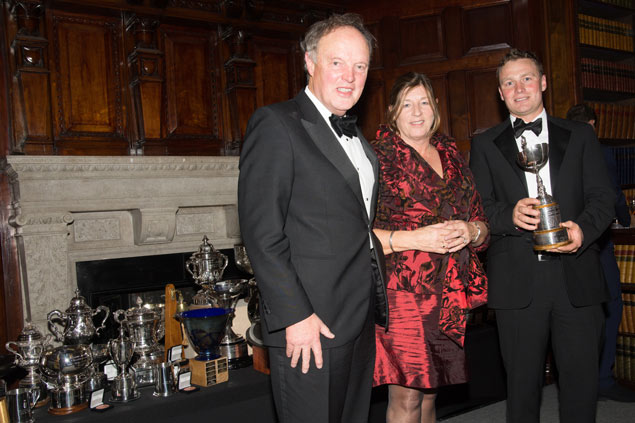 Michael Boyd (left) Jane Anderson, the RORC Commodore’s wife, and Kenny Rumball at the RORC London prizegiving Photo: Mags Hudgell/RORC
Michael Boyd (left) Jane Anderson, the RORC Commodore’s wife, and Kenny Rumball at the RORC London prizegiving Photo: Mags Hudgell/RORC
After a champagne reception, the dinner and prize giving were held in the theatre-style Gladstone Library. The Grade I listed hotel overlooking the Thames has strong links to the British Military and Gladstone has a fortuitous link to the 2018 Yacht of the Year. Every prize winner was roundly applauded as they took centre stage at the glamorous event. There was a huge ovation for the overall winner of the 2018 RORC Season's Points Championship, British Soldier, and for the RORC Yacht of the Year, Ichi Ban.
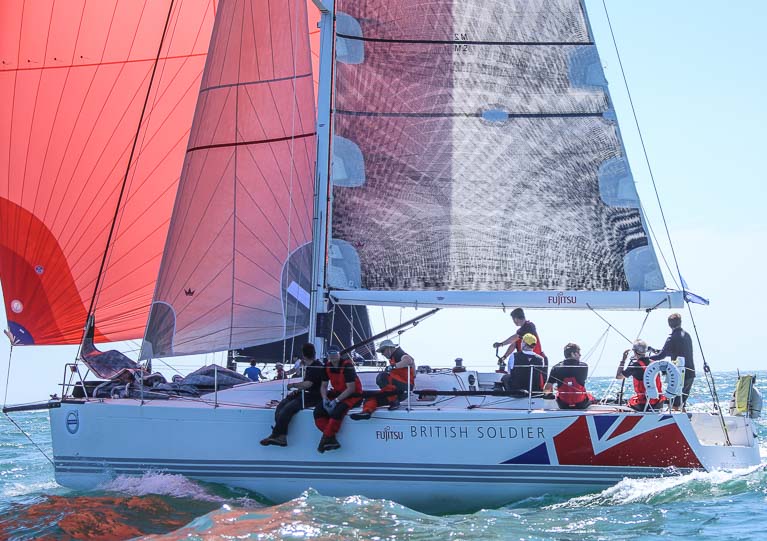 Army Sailing Association's X-41 British Soldier competing off Wicklow in the Round Ireland race Photo: Afloat.ie
Army Sailing Association's X-41 British Soldier competing off Wicklow in the Round Ireland race Photo: Afloat.ie
Winning the Jazz Trophy for first overall in IRC was the Army Sailing Association's X-41 British Soldier, the first Armed Services team to win the championship since it was established in 1999. British Soldier took part in 11 races, winning the championship in the very last race, with crew members ranging from Private soldiers, through Sergeants, right up to Colonel. Five different skippers were in charge during the campaign: Andrew Britton, Will Naylor, Phil Caswell, Paul Macro and Donal Ryan.
Andrew Britton commented: "It's been a fantastic privilege to run the Army's campaign for the last two years and we've really seen our team go from strength to strength in that time. Our X-41 has surpassed our high expectations and we have got her going pretty well now. Our people are our greatest asset though, and the team spirit, commitment and resilience has been amazing. We wanted to really go for it this year and worked hard to achieve a consistent series of podium finishes. I knew we had a chance overall with the Middle Sea Race and am thrilled it went to the wire like that. This win means so much, not just for the team, but for sport in the Services as a whole."
The 2018 RORC Yacht of the Year, winning the Somerset Memorial Trophy was Matt Allen's Ichi Ban. Matt's Australian team won the Brisbane to Gladstone Race, the Rolex Sydney Hobart, and the Sydney Gold Coast Race. Ichi Ban's series of results, in the three major Ocean races in Australia, has never been matched. Howth Yacht Club ex-pat Gordon Maguire is a key member of Ichi Ban's crew.
"On behalf of the whole crew of Ichi Ban, we are absolutely thrilled to win RORC Yacht of the Year," commented Matt Allen. "It is a great thrill for us, especially from the other side of the world. I really want to thank the panel for voting for us and thank you to the RORC for thinking so internationally, as you have always done over many decades. The RORC boat Rani was the instigator of the Rolex Sydney Hobart Race back in 1945."
After the Prize Giving, guests partied until the early hours with a live set from the Milo Max Band courtesy of RORC partner Sevenstar Yacht Transport. Fastnet Marine Insurance also supported the event, as they have done for the last 10 years, and this year William Grant & Sons Distillers continued to provide every guest with gifts on the night.
The 20th edition of the RORC Season's Points Championship will start on 24th November 2018 with the RORC Transatlantic Race. The 2019 championship will consist of 14 races including the Royal Ocean Racing Club's flagship event, the Rolex Fastnet Race, starting on 3rd August 2019. For more information: www.rorc.org
RORC Race Results for the 2018 season HERE
RORC SEASON'S POINTS CHAMPIONSHIP WINNERS 2018
British Soldier, X-41, Army Sailing Association -IRC Overall & Best Series produced yacht & Best British Service Yacht - Jazz Trophy/Serendip Trophy/Haylock Cup
Ichi Ban, TP52, Matt Allen - Yacht of the Year
Winner of the 2017 Brisbane to Gladstone Race, the 2017 Rolex Sydney Hobart Yacht Race, the 2018 Brisbane Gladstone Race and 2nd in the 2018 Sydney Gold Coast Race. This series of results in the three major Ocean races in Australia has never been matched - Somerset Memorial Trophy
Lady Mariposa, Ker 46, Dan Hardy, Lady Mariposa Racing Inc - IRC Zero & Best Yacht on IRC Overall Points for this race & Best Yacht on IRC Overall Points for this race
Europeans Cup/Assuage Tankard - Myth of Malham Race/Assuage Tankard - Cherbourg Race
Hooligan VII, Ker 40, Ed Broadway - IRC One & Best Elapsed time of an IRC yacht in Cervantes, Morgan Cup, St Malo and Cherbourg & Highest points score from any 3 offshore Races where at least 33% of crew were under 25 on 1st Jan 2018
Trenchemer Cup/Highwayman Cup/Highwayman Cup/Peter Harrison Youth Trophy
Scarlet Oyster, Oyster 48, Ross Applebey - IRC Two, Emily Verger Plate
Game On, Sun Fast 3600, Ian Hoddle - IRC Three & Two-Handed Class & RORC member
Best IRC overall from Cherbourg + 3 from Cervantes, Morgan Cup, Myth of Malham and St Malo - Grenade Goblet/Psipsina Trophy/Assuage Trophy for RORC Members
Foggy Dew, JPK 10.10, Noel Racine - IRC Four & Best Overseas Yacht, Cowland Trophy/Stradivarius Trophy
Arthur Logic, First 40, Sailing Logic - Best Sailing School Yacht
David Fayle Memorial Cup
Arthur Logic, First 40, Jonathan Tyrrell - 3,101nm completed as Skipper; Cervantes Trophy, Myth of Malham, Volvo Round Ireland, Channel, Sevenstar Round Britain and Ireland, Cherbourg (Also started St Malo). Between 15 & 25 on 1st Jan 2018 with most RORC miles in current season and yacht is in top three of class, Duncan Munro Kerr Youth Challenge Trophy
Bellino, Sun Fast 3600, Rob Craigie & Deb Fish - Mixed Two-Handed Division,
The Boyd Trophy
Buzz, Seacart 30, Ross Hobson - 1st Multihull, RORC Decanter
Concise 8, Class40, Tony Lawson, Sailed by Jack Trigger - 1st Class40, Concise Trophy
Imerys Clean Energy, Class40, Phil Sharp - Best British Yacht Overseas
1st Sevenstar Round Britain & Ireland, 1st Class40 European Trophy, 1st Normandy Channel Race, 2nd Dhream Cup, Dennis P Miller Memorial Trophy
Jangada, JPK 10.10, Richard Palmer - Consistent High Performance
Alan Paul Trophy
Jedi, J/109, Michael Boyd/Kenneth (Kenny) Rumball - Outstanding act of seamanship:
Michael Boyd / Kenneth Rumball with the J/109 Jedi which did an incredible job in recovering a man overboard in Round Ireland in horrendous conditions. It was dark with very big seas and they recovered the man safely within a couple of minutes. Very impressive; the outcome could easily have been very different. Seamanship Trophy
Louise Racing, Dragon, Grant Gordon - Outstanding Keelboat Performance by a RORC Member - 3rd Edinburgh Cup, 2nd Hans-Dietmar Wagner Cup, 4th Paul & Shark San Remo Dragon Grand Prix. Meritorious Award
Lyra of London, Swan 431, Miles Delap - Best Swan, Arambalza Swan Cup
Major Will Naylor & Major Phil Caswell, Army Sailing Association - Navigator of the IRC Overall Yacht, Keith Ludlow Trophy
Philosophie IV, First 40.7, Nicolas Gaumont-Prat - BestYacht on IRC Overall Points for this race. Assuage Tankard - Morgan Cup Race
Pintia, J/133, Gilles Fournier - Best Yacht on IRC Overall Points for this race, Assuage Tankard - Cervantes Trophy Race
Spirit, Sigma 38, Paul Scott - For the Sigma 38 with the highest Season's Points, Oldland/Watts Aquadanca Trophy
Ster Wenn 5, X-442, Pierre Sallenave - Best Yacht on IRC Overall Points for this race, Assuage Tankard - Cowes Dinard St Malo Race
Varuna, Ker 56, Jens Kellinghusen - Giving Redress - For rendering assistance to Fujin during the RORC Caribbean 600 Race - The Pera Awards
Winsome, S&S 41, Harry Heijst - Classic Yacht in IRC (defined as 40 years old) & Concours d'Élegance in RORC Race - meticulously maintained S&S41 from 1972, Freddie Morgan Trophy/Beken Trophy




























